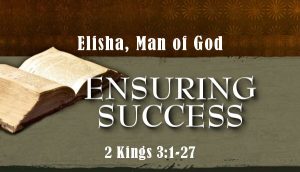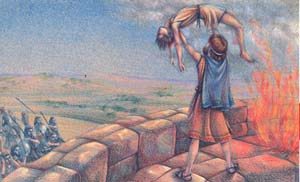
Wisdom-Trek / Creating a Legacy
Welcome to Day 906 of our Wisdom-Trek, and thank you for joining me.
I am Guthrie Chamberlain, Your Guide to Wisdom
Promise Undelivered – Wisdom Wednesday

Thank you for joining us for our five days per week wisdom and legacy building podcast. Today is Day 906 of our trek, and it is Wisdom Wednesday. Creating a Biblical worldview is important to have a proper perspective on today’s current events. To establish a Biblical worldview, you must also have a proper understanding of God’s Word.
Especially in our western cultures, we do not fully understand the Scriptures from the mindset and culture of the authors. In order help us all have a better understanding of some of the more obscure passages in God’s Word, we are investing Wisdom Wednesday reviewing a series of essays from one of today’s most prominent Hebrew Scholars Dr. Micheal S. Heiser. He has compiled these essays into a book titled “I Dare You Not to Bore Me with the Bible.”
We are broadcasting from our studio at The Big House in Marietta, Ohio. None of us like to have something promised to us, and then that promise is not fulfilled. It seems like most political candidates do that when they are running for office, but once they are elected do not fulfill what they promise. Unlike that situation though, we know that God’s promises will be fulfilled, but that fulfillment may be based on our belief and faithfulness to Him. Today’s essay explores one such incident as we will focus on…
Promise Undelivered

To set the picture for today’s essay, I will read the entire chapter of 2 Kings 3 the setting for this passage is shortly after the death of wicked King Ahab of Israel.
Ahab’s son Joram began to rule over Israel in the eighteenth year of King Jehoshaphat’s reign in Judah. He reigned in Samaria twelve years. He did what was evil in the Lord’s sight, but not to the same extent as his father and mother. He at least tore down the sacred pillar of Baal that his father had set up. Nevertheless, he continued in the sins that Jeroboam son of Nebat had committed and led the people of Israel to commit.
King Mesha of Moab was a sheep breeder. He used to pay the king of Israel an annual tribute of 100,000 lambs and the wool of 100,000 rams. But after Ahab’s death, the king of Moab rebelled against the king of Israel. So King Joram promptly mustered the army of Israel and marched from Samaria. On the way, he sent this message to King Jehoshaphat of Judah: “The king of Moab has rebelled against me. Will you join me in battle against him?”
And Jehoshaphat replied, “Why, of course! You and I are as one. My troops are your troops, and my horses are your horses.” Then Jehoshaphat asked, “What route will we take?”
“We will attack from the wilderness of Edom,” Joram replied.
The king of Edom and his troops joined them, and all three armies traveled along a roundabout route through the wilderness for seven days. But there was no water for the men or their animals.
“What should we do?” the king of Israel cried out. “The Lord has brought the three of us here to let the king of Moab defeat us.”
But King Jehoshaphat of Judah asked, “Is there no prophet of the Lord with us? If there is, we can ask the Lord what to do through him.”
One of King Joram’s officers replied, “Elisha son of Shaphat is here. He used to be Elijah’s personal assistant.[b]”
Jehoshaphat said, “Yes, the Lord speaks through him.” So the king of Israel, King Jehoshaphat of Judah, and the king of Edom went to consult with Elisha.
“Why are you coming to me?”[c] Elisha asked the king of Israel. “Go to the pagan prophets of your father and mother!”
But King Joram of Israel said, “No! For it was the Lord who called us three kings here—only to be defeated by the king of Moab!”
Elisha replied, “As surely as the Lord Almighty lives, whom I serve, I wouldn’t even bother with you except for my respect for King Jehoshaphat of Judah. Now bring me someone who can play the harp.”
While the harp was being played, the power of the Lord came upon Elisha, and he said, “This is what the Lord says: This dry valley will be filled with pools of water! You will see neither wind nor rain, says the Lord, but this valley will be filled with water. You will have plenty for yourselves and your cattle and other animals. But this is only a simple thing for the Lord, for he will make you victorious over the army of Moab! You will conquer the best of their towns, even the fortified ones. You will cut down all their good trees, stop up all their springs, and ruin all their good land with stones.”
The next day at about the time when the morning sacrifice was offered, water suddenly appeared! It was flowing from the direction of Edom, and soon there was water everywhere.
Meanwhile, when the people of Moab heard about the three armies marching against them, they mobilized every man who was old enough to strap on a sword, and they stationed themselves along their border. But when they got up the next morning, the sun was shining across the water, making it appear red to the Moabites—like blood. “It’s blood!” the Moabites exclaimed. “The three armies must have attacked and killed each other! Let’s go, men of Moab, and collect the plunder!”
But when the Moabites arrived at the Israelite camp, the army of Israel rushed out and attacked them until they turned and ran. The army of Israel chased them into the land of Moab, destroying everything as they went. They destroyed the towns, covered their good land with stones, stopped up all the springs, and cut down all the good trees. Finally, only Kir-hareseth and its stone walls were left, but men with slings surrounded and attacked it.
When the king of Moab saw that he was losing the battle, he led 700 of his swordsmen in a desperate attempt to break through the enemy lines near the king of Edom, but they failed. Then the king of Moab took his oldest son, who would have been the next king, and sacrificed him as a burnt offering on the wall. So there was great anger against Israel, and the Israelites withdrew and returned to their own land.

When exposed to evil, we might doubt God’s presence. Soldiers’ accounts and memoirs often recall times of doubt as they grappled with the atrocity of war and, ultimately, the struggle between good and evil. While Scripture is clear that good will triumph, it also says evil will win its share of battles. Second Kings 3 records a war event where evil won.
· Yahweh Takes Sides
Second Kings 3 describes the rebellion of Moab, led by its king, Mesha, against the monarch of the northern kingdom of Israel, King Jehoram. Like his father Ahab, Jehoram solicited King Jehoshaphat of Judah (the southern kingdom) for assistance against his enemy. They were joined by the king of Edom. The invasion route, by way of the wilderness of Edom, is critical to the storyline. Edom was the territory settled by the descendants of the red-haired Esau. “Edom, a play on the word adom (“red”), was epitomized by the reddish soil and rock of its wilderness.
By taking a circuitous approach to Moab, the invading armies crossed desert terrain without water. Jehoshaphat called the wilderness-wandering prophet Elisha for advice. After a testy response to Jehoshaphat’s plea, Elisha received word from Yahweh…“God would supply the armies with water. It would appear, without rain, in a streambed that was presently bone dry. Elisha had even better news…‘This is a light thing in the sight of the Lord. He will also give the Moabites into your hand.’”

· No Faith, No Gain
When they arrived at the place of battle, the Moabite soldiers were fooled by the pools of water that appeared red against the ground and the sun’s reflection. They assumed it was blood and that invading armies, who were often enemies themselves, had erupted in battle against each other. When the Moabites approached to strip and plunder the dead, they were ambushed by the invading armies.
In desperation, the king of Moab committed a horrible atrocity, “Then the king of Moab took his oldest son, who would have been the next king, and sacrificed him as a burnt offering on the wall.” The meaning of the next line is hotly debated, “So there was great anger against Israel, and the Israelites withdrew and returned to their own land.”
Why did this happen? Why wasn’t Yahweh victorious? After all, Elisha had said God would give the invaders victory ([3:18]).

In the Old Testament, we read that the Israelites believed the gods of other nations were real, assigned to the nations by Yahweh, who was superior and ruled over all other gods (Deut. 32:8-9). They believed these gods were demons—real spiritual beings (Deut [32:17]). Given the nature of this worldview, it seems the Israelites were frightened by the sacrifice and lost faith, thinking Moab’s god was angry against them and would empower Moab to win because of the sacrifice.
Elisha had told the kings of Israel and Judah that God would help them. So why had He not? This situation isn’t the first time God promises but chooses not to deliver. God had told the Israelites that they would conquer Canaan under Moses and Joshua, yet they failed because of unbelief (Num. 13, Deut. 31:1-7, Josh. 13:1-5, and Judges [1:27]-36).
Yahweh was not defeated by the god of Moab. He was, and is, ready and able to help His people. But He will not do so if they refuse to believe and act on that belief.
Next Wisdom Wednesday we will continue with the Old Testament as we look at Dr. Heiser’s next essay titled “Sanctified Dirt.” I believe you will find this another interesting topic to consider as we build our Biblical worldview.
Tomorrow we will continue with our 3-minute humor nugget that will provide you with a bit of cheer and help you to lighten up and live a rich and satisfying life. So encourage your friends and family to join us and then come along with us tomorrow for another day of our Wisdom-Trek, Creating a Legacy.

If you would like to listen to any of our past 905 treks or read the Wisdom Journal, they are available at Wisdom-Trek.com. I encourage you to subscribe to Apple Podcast or Google Podcast so that each day’s trek will be downloaded automatically.
Thank you for allowing me to be your guide, mentor, and most importantly, your friend as I serve you through the Wisdom-Trek podcast and journal.
As we take this trek together, let us always:
- Live Abundantly (Fully)
- Love Unconditionally
- Listen Intentionally
- Learn Continuously
- Lend to others Generously
- Lead with Integrity
- Leave a Living Legacy Each Day
I am Guthrie Chamberlain reminding you to Keep Moving Forward, Enjoy Your Journey, and Create a Great Day Everyday! See you tomorrow!
[…] I am Guthrie Chamberlain reminding you to Keep Moving Forward, Enjoy Your Journey, and Create a Great Day Everyday! See you tomorrow for Wisdom Wednesday! […]